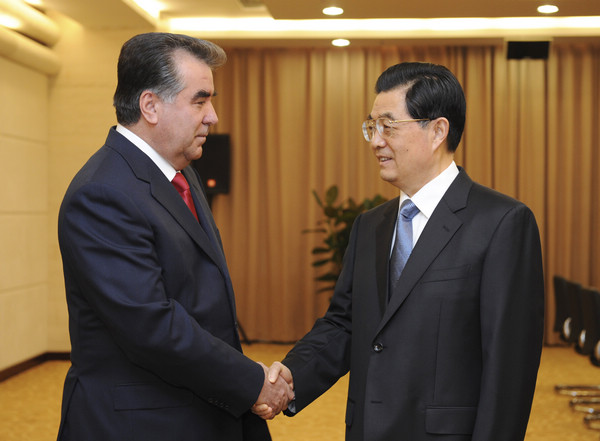Foreign and Military Affairs
Hu vows to strengthen Tajik, Kyrgyz relations
By Wu Jiao and Cheng Guangjin (China Daily)
Updated: 2011-06-15 07:30
 |
Large Medium Small |
 President Hu Jintao meets his Tajik counterpart Emomali Rahmon in Astana, capital of Kazakhstan, on Tuesday. [Photo / Xinhua] |
ASTANA/BEIJING - President Hu Jintao met his counterparts from Tajikistan and Kyrgyzstan on Tuesday, and stressed that China will work hard to further enhance relations with the two Central Asian countries.
When meeting with Tajik President Emomali Rahmon, Hu noted that China, as a close neighbor, sincerely hopes for long-lasting peace and common prosperity in Central Asia, and is willing to make unremitting efforts to achieve this with Tajikistan and other countries in the region.
The summit in the capital of Kazakhstan will mark the 10th anniversary of the founding of the SCO, which is dedicated to security and economic cooperation among its member states.
Hu told Rahmon that China and Tajikistan greatly complement each other in their cooperation, which has a bright future.
In recent years bilateral cooperation has made remarkable achievements, and China is willing to deepen cooperation with Tajikistan in areas including trade, infrastructure, mining, communications and agriculture, Hu told his Tajik counterpart.
Hu said China is also willing to implement and expand cooperation in large projects, including the infrastructure construction of the Karasu-Kulma port connecting the two countries.
Rahmon said advancing friendly and cooperative bilateral relations remains the priority of Tajikistan's foreign policy.
The two countries have developed a relationship based on mutual trust, said Rahmon, who expressed satisfaction over the two countries' coordination on bilateral and multilateral issues.
Rahmon reiterated Tajikistan's firm adherence to the one-China policy and determination to combat drug trafficking and the "three evil forces" of terrorism, extremism and separatism.
Later in talks with his Kyrgyz counterpart Otunbayeva, Hu said China is willing to increase contacts with Kyrgyzstan and enhance political trust, deepen mutual cooperation in all areas, and elevate bilateral relations to a new level.
The two sides agreed to increase political trust, and deepen cooperation in trade, infrastructure and security.
They also pledged to fight terrorism, separatism and extremism, drug trafficking and other cross-border crimes and to safeguard security and stability in the two countries and the region.
It was the first meeting between Hu and Otunbayeva since she took office in July 2010, after acting as interim leader following the ousting of then president Kurmanbek Bakiyev in April 2010 .
Analysts said China and the two Central Asian nations have maintained close relations in recent years, and it is important for both sides to guarantee smooth cooperation.
Wu Hongwei, a researcher at the Institute of Russian, Eastern European, Central Asian Studies of the Chinese Academy of Social Sciences, said the meetings of the leaders would inject new momentum into bilateral ties.
"It's important that the two Central Asian nations maintain political and social stability for the cooperative projects to proceed smoothly," said Wu.
Riots in Kyrgyzstan in 2010 led to big losses for Chinese businesses there, said Zhao Mingwen, research fellow and director of the Center for Periphery Security Studies at China Institute of International Studies.
Also last year, terrorist attacks in Dushanbe and eastern Tajikistan were a blow to investors' confidence, said Zhao.
Nevertheless, trade and political ties between China and the two countries have continued to grow in recent years, said Zhao.
Statistics show that Sino-Tajik bilateral trade reached $1.4 billion in 2010, an increase of 2 percent year-on-year.
In 2010, bilateral trade between China and Kyrgyzstan recovered to $4.2 billion following the global financial crisis in 2008.
| 分享按钮 |




